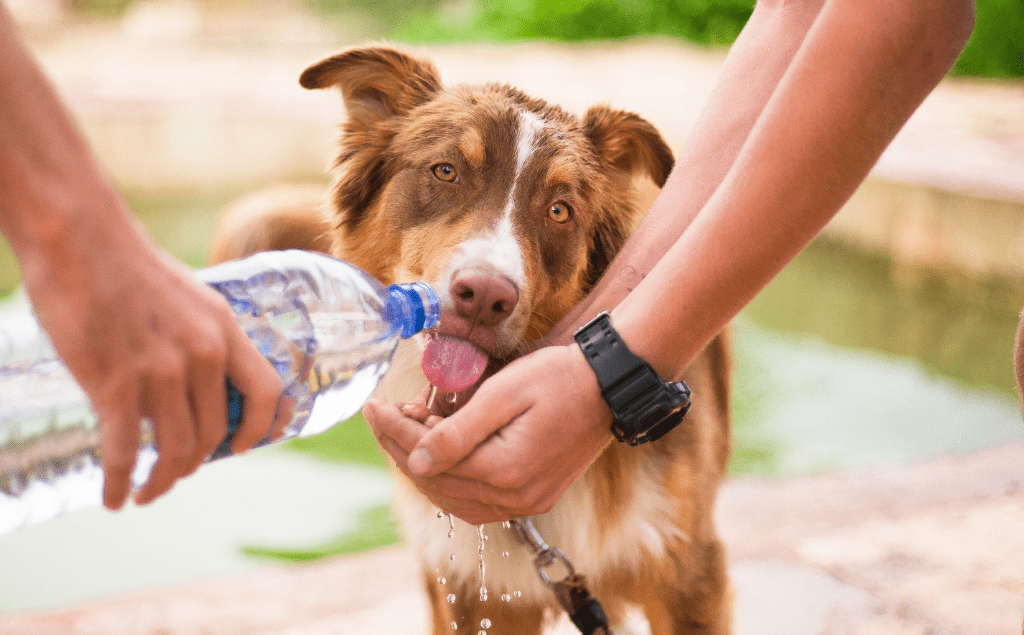Dehydration in Dogs: Causes and Symptoms
Dehydration happens in dogs when their bodies have expended more water than they’ve consumed. Every animal requires water to stay alive, and it is essential to a properly functioning body. Water is crucial to joints, internal organs, digestion and regulating body temperature. Without enough water, the cells in a dog’s body cannot properly absorb nutrients.

How Can My Dog Get Dehydrated?
The amount of water in a dog’s body fluctuates throughout the day. Playing, panting, breathing, sweating through the pads of his feet, and going to the bathroom are all ways of expending fluid. As he loses liquid, he makes up for it by eating and drinking. It’s highly important that your dog has a generous supply of fresh drinking water at all times do counteract his expenditure of water.
If your dog is playing vigorously or outside on a hot day, he is more susceptible to dehydration. If his body starts to run out of water, his blood flow slows down and his organs and tissue don’t get enough oxygen.
Dehydration can also cause him to lose electrolytes like sodium, chlorine and potassium. Without these important minerals, his body may have a hard time properly metabolizing food, balancing his body’s pH, and regulating muscle and nerve function. In extreme cases, dehydration can cause organ damage, or even death.
Although he can’t talk, there are many ways his body and behavior communicate when he’s feeling dehydrated.
Symptoms of Dehydration in Dogs
Common symptoms that could mean that your dog is dehydrated include:
Skin Dryness
If a dog is properly hydrated, you should be able to use your thumb and forefinger to pinch a piece of skin on the back or top of his head and have it bounce right back into place. As he begins to expel moisture, the skin slowly returns to form and in cases of more extreme dehydration, the skin might not even spring back at all.
This loss of elasticity is called a “skin tent.” This test is a little harder to conduct in older or obese dogs, or breeds with a lot of folds in their skin such as Pugs or Sharpeis.
Panting
While it’s perfectly normal for your dog to pant when he’s excited about something or playing, pay close attention to the way he’s panting and if it’s accompanied by other behaviors. If his pupils are dilated, or he starts to seem lethargic, it’s important to get him some water immediately and monitor his symptoms.
Vomiting
If a dog is starting to get dehydrated, this may result in him feeling dizzy and nauseous. You might not notice he’s feeling out of sorts right away, but he might throw up as a result of the loss of fluid.
Vomiting on its own is not indicative of dehydration, but if he’s been outside on a hot day or playing strenuously, this could be an indicator of dehydration and it’s imperative to get him some cool water immediately.
Diarrhea
A dog that’s starting to feel dehydrated might have a runny stool or diarrhea. This is his body’s involuntary reaction to not having enough fluids and he should be given water right away.
Dark Urine
When a dog is properly hydrated, his urine should be light in color and highly transparent. As his body runs out of fluids, his urine gets more concentrated and gets darker. If you notice that your dog’s urine looks dark or different than usual, make sure he gets water, and pay attention to the appearance of his urine.
If his urine still seems abnormal even after he’s been sufficiently hydrated, this could be the sign of something like a urinary tract infection or kidney issue. Your vet will want to collect a sample to run a urinalysis to determine the reason or reasons behind the change in the appearance of his urine.
Increased Heart Rate
Your dog’s heart might start beating faster as his body starts to feel dehydrated. If you notice his heartbeat has quickened, pay attention and if it goes above 140, he might be feeling dehydrated.
Changes to Behavior
A dog that is getting dehydrated may start acting confused or disoriented. He may also become lethargic or fatigued. If you notice your dog behaving out of the ordinary, give him plenty of water and pay close attention to the way he acts in the next few hours.
If his behavior doesn’t improve, your vet may want to give him fluids and check to see if there is anything else causing the change.
Causes of Dehydration in Dogs
Some causes of dog dehydration include, but aren't limited to:
Vomiting
While vomiting can be a symptom of dehydration, it can also be a cause. Sometimes when a dog eats something he shouldn’t have or has something else going on which results in him throwing up, it can lead to dehydration.
If your dog has been vomiting, it’s important to make sure he has plenty of fluids and wet dog food if possible.
Excessive Heat
Dogs are more prone to dehydration because of their thick skin and fur coats. Their body temperature can rise quickly on a hot day or inside a hot car or home. It’s important never to leave your dog in a car or home without the same level of air conditioning you would feel comfortable in and to bring him indoors on particularly hot days.
Changes to Health
Older dogs are at a higher risk of dehydration because their bodies aren’t as efficient as they once were and they made need more water than they before in order to keep everything functioning properly.
Mother dogs that are pregnant or nursing are also more susceptible to hydration because their bodies are expending so much fluid providing nutrition for their offspring.
Long term ailments such as kidney disease or cancer can also lead to dehydration, as the dog’s natural ability to maintain hydration is compromised.
Predisposition
Small breeds, like Chihuahuas are more prone to dehydration because their little bodies are already working so hard to keep everything regulated. On top of that, due to their size, they simply can’t retain as much fluid as a larger dog.
See an Emergency Vet if Your Dog's Dehydrated
All sorts of things can cause a dog to be dehydrated and the presentation of symptoms varies widely. As a rule, always make sure that your dog has access to fresh, clean water. If you take him for a walk, be sure to bring water for him too.
If you notice that your dog may be dehydrated, it's important to take them to the veterinarian to have an examination to make sure there isn't something more serious that's also causing this problem. If your dog is experiencing severe symptoms of dehydration, you should take them to the emergency vet so they can start being treated immediately.
Our experienced team at Emergency Veterinary Care Centers are here for your pet 24 hours a day so that they never have to wait to be treated. While dehydration may not require emergency care right away, the condition can get worse if left untreated.
If you think your dog may be dehydrated and don't know if you should bring in your pet, contact either of our locations and our team will be happy to help you any time of day.
Recent Posts
About Us
At Emergency Veterinary Care Centers (EVCC), we know that pet emergencies are unpredictable and often stressful. That's why our team, with over 20 years of emergency and critical care experience, is ready to assist you and your pet in the toughest situations.


